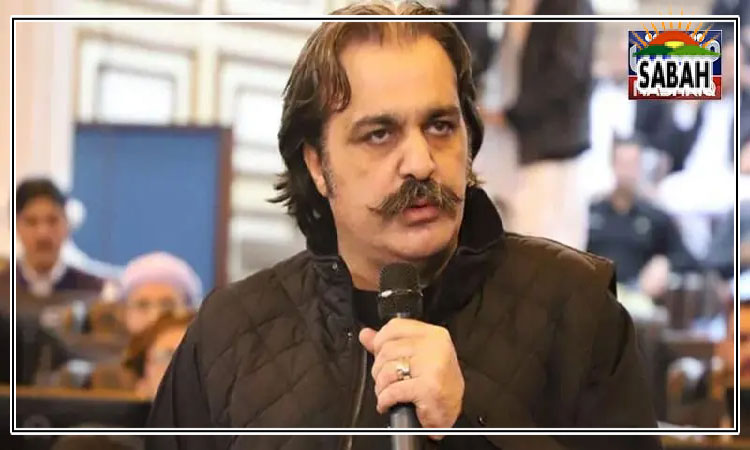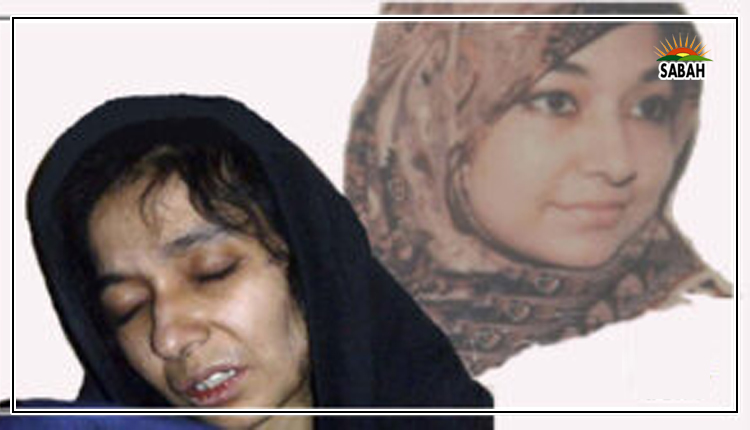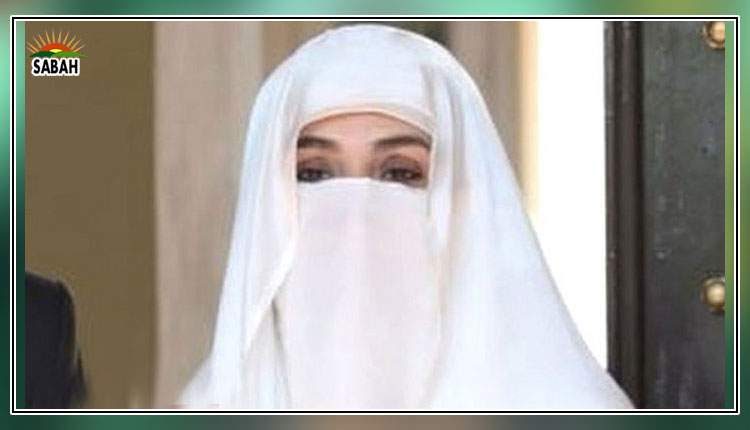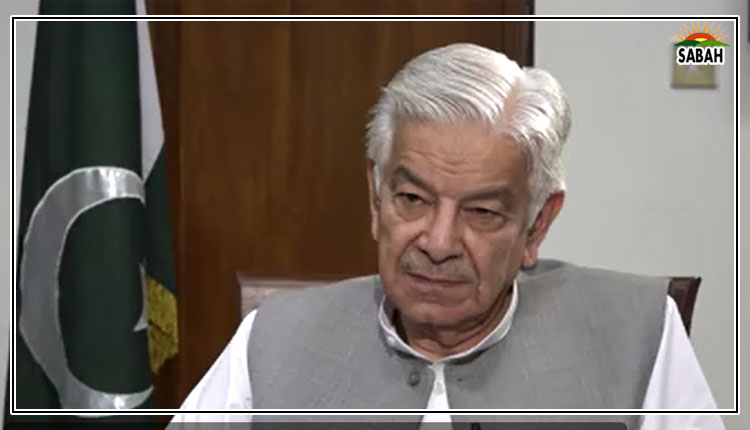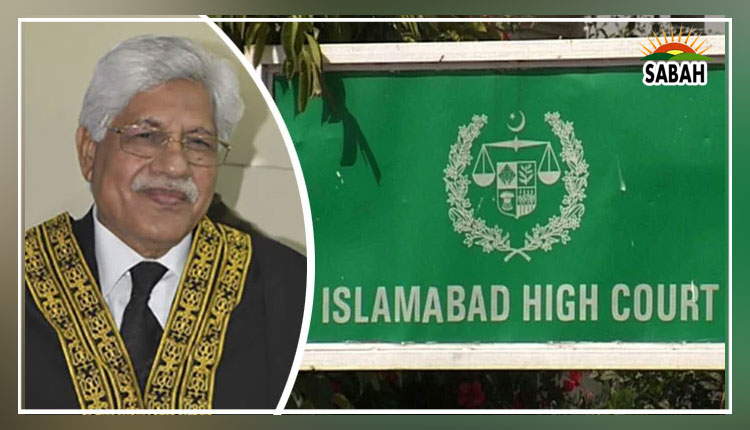CJ IHC Athar Mianllah defers indictment of Rana Muhammad Shamim & others in affidavit case till 20th January 7, 2022
ISLAMABAD, Jan 07 (SABAH): Islamabad High Court (IHC) Chief Justice Athar Minallah on Friday postponed the framing of charges in a contempt of court case against former Gilgit-Baltistan chief justice Rana Muhammad Shamim, newspaper owner Mir Shakeelur Rehman and senior journalists Ansar Ahmed Abbasi and resident editor of the newspaper Aamir Ghauri on Friday in connection with a news report about an affidavit that accused former chief justice of Pakistan Mian Saqib Nisar of trying to delay the release from prison of top PML-N leadership.
IHC Chief Justice Athar Minallah gave Rana Muhammad Shamim and the others time until the next hearing on January 20 to “reflect” on the matter, saying “acceptance of mistake in front of the court increases honour.” He also rejected Attorney General Barrister Khalid Jawed Khan’s request to allow Mir Shakeelur Rehman — who tested positive for coronavirus — to attend court proceedings via video link and said he would need to be present in court for the indictment.
During the last hearing, Rana Shamim had opened his original affidavit — submitted earlier in December, more than a month after it was mentioned in the report published in “The News International”— on the court’s instructions. IHC Chief Justice Athar Minallah had asked Shamim if the document was the former judge’s affidavit and whether he had sealed it himself to which Shamim replied in the affirmative.
Subsequently, the IHC had decided to indict all the alleged contemnors on January 7 (Friday).
In a written order issued last month, the IHC chief justice had appointed Attorney General Khalid Jawed Khan as prosecutor in the contempt of court case.
Shamim, his counsel lala Abdul Lateef Afridi, AG Khan, Ghauri and Abbasi were present during today’s hearing. Advocate General of Islamabad Niazullah Niazi and Additional Attorney General Qasim Wadood were also present.
At the outset of the hearing, Justice Minallah observed that the court believed in the freedom of expression. He noted that a “narrative” was being built regarding a bench of the high court comprising him, Justice Mohsin Akhtar Kayani and Justice Miangul Hassan Aurangzeb — which is hearing a petition seeking the formation of an independent commission to ascertain the authenticity of an alleged audio of Nisar and probe certain events before and after Nawaz Sharif’s conviction — that judges “made decisions under pressure”.
The people’s trust was being eroded because of such news items, he added.
Addressing Abbasi, Justice Athar Minallah said the court was not questioning the journalist’s integrity but trying to make him realise the effect of the news story.
The judge noted that Abbasi had said the newspaper would have published the affidavit even if it “may be wrong”. He asked if the newspaper did not know what case the story about the affidavit would influence, in an apparent reference to Maryam Nawaz’s ongoing appeal against her conviction in the Avenfield reference.
“Either you (Abbasi) say you did not know [about the influence the story would have] … let us frame charges, then you can present your stance,” the judge said in response to Abbasi’s request to not indict him.
Justice Minallah observed that the public’s rights were most important to the court. Recalling the details of the case, Justice Minallah said that a judge had allegedly spoken to CJP Nisar but he was not part of the bench hearing the case against Nawaz and his daughter.
Justice Kayani and Justice Aurangzeb were part of the bench and the appeals were later heard by my bench, Justice Minallah noted. “This narrative can affect all three of us. The cases being heard by the [judges] mentioned in the story were fixed for two days later (from the date in the report).
“The court has tried to make you understand what mistake you made during the entire hearing,” the IHC judge said.
Amicus curiae Nasir Zaidi, a representative of the Pakistan Federal Union of Journalists (PFUJ), appealed to the court to not frame charges and find a “middle ground”.
Addressing Abbasi again, IHC Chief Justice Minallah noted that the journalist had said the newspaper would publish an affidavit “even if it is false”. “If we know it is false, we will report it as false,” Abbasi responded.
At this, Justice Minallah pointed out that there was a contradiction between Abbasi’s previous statement and the latest one.
Journalist Amir Ghauri said the newspaper also published statements made by the prime minister and ministers every day.
The judge noted that the affidavit should not have been published if the journalists did not know whether it was accurate.
“All affidavits in the Justice Iftikhar Muhammad Chaudhry case were published. I did not mention the name of the high court in the story about the affidavit. I was careful but the court believed that all judges were made to look suspicious.
“[Dawn editor] Zaffar Abbas said that he would have done the same as Ansar Abbasi if he had gotten the affidavit,” the journalist contended.
Justice Minallah responded that it was just as well that Abbas did not publish the affidavit otherwise there would also be a contempt of court case against him, adding that Abbasi should have asked a lawyer about the effect of the affidavit.
Advocate Faisal Siddiqui, who is also an amicus curiae in the case, informed the court that a contempt of court case could be made against Rana Shamim but not the journalists.
He said there had been “negligence” on the part of the journalists in the publication of the news story but it was not tantamount to contempt of court. Abbasi should have waited to publish the news story and found out more information, he added. Siddiqui asked Abbasi to step back from his present stance.
At this Justice Minallah responded that the problem was related to the journalist’s stance as well as the lack of regret.
He observed that the court’s judgments regarding the rights of the common man were broadcasted in the media, more so if the verdict was related to someone prominent. “A political narrative is created to erode the public’s trust in the court. Which judgment of this court has given the impression that it is compromised or that judges can be pressured?” he questioned.
Amicus curiae Reema Omer informed the court that it was necessary for a journalist to take adequate care when publishing a story, noting that Abbasi had also included Nisar’s version in his report.
“The journalist took adequate care to some extent when publishing the story,” she added.
Omer said that if contempt of court did take place, it was on the part of he who recorded his statement in the affidavit.
She said that the matter pertains not only to the freedom of expression but also to the right of access to information.
Omer noted that when the news first broke, the affidavit also did the rounds on social media, but the news story made no mention of the Islamabad High Court or any judge.
She lauded the court’s efforts to ensure freedom of expression remains intact in Pakistan.
The legal expert said that it is the duty of a journalist to exercise reasonable care before publishing a story. She noted that Ansar Abbasi had included Saqib Nisar’s stance in his story and that overall reasonable care had been exercised in the story’s publication.
She said that there is no precedent for the media being blamed for publishing a story regarding a statement that a party continues to stand by.
Omer said a judge of the same court, Shauqat Aziz Siddiqui, had leveled several serious allegations against the court which were reported by media all over Pakistan. “In that case, a judge was put under scrutiny, but no action was taken against the media,” she said.
The IHC chief justice asked whether the narrative that a bench was formed to delay the verdict at someone’s behest should be considered true. “Are you suspecting that this court’s benches are formed at someone’s behest?” he asked. “Not at all. I am not suggesting such a thing at all,” Omer replied.
The amicus curiae was then asked to take a seat by Justice Minallah and the court called upon Rana Shamim’s lawyer.
Ex-CJ GB Rana Shamim’s counsel Abdul Latif Afridi started his arguments and stated that it was not possible to stop an international organisation from commenting on anything.
Afridi, noting that every day some minister or adviser gives a statement which also gets published, also argued that since one of the suspects was not present in court today, charges should not be framed.
As the lawyer was speaking, Abbasi told the IHC CJ that he took care while publishing the affidavit and did not name the judge in the story. “I thought that this matter was no longer moot.”
Attorney General of Pakistan (AGP) Khalid Jawed Khan said in no way should the trial be affected, no matter who is at fault, as he noted that in case journalist Abbasi receives an affidavit from now on, he will make sure to investigate it further.
The AGP said the court should indict Rana Shamim and that he would be given a fair trial. However, he asked the court to delay the indictment of the journalists. “But they should remain present during court proceedings”.
After hearing the arguments, the IHC CJ told the journalist that he was not questioning his credibility, but also said: “Abbasi sahab, I do not doubt your credibility, but you do not realise that you are at fault here.”
Subsequently, the IHC adjourned the hearing due to Mir Shakeel-ur-Rehman’s absence as he is currently under quarantine due to Covid-19.


